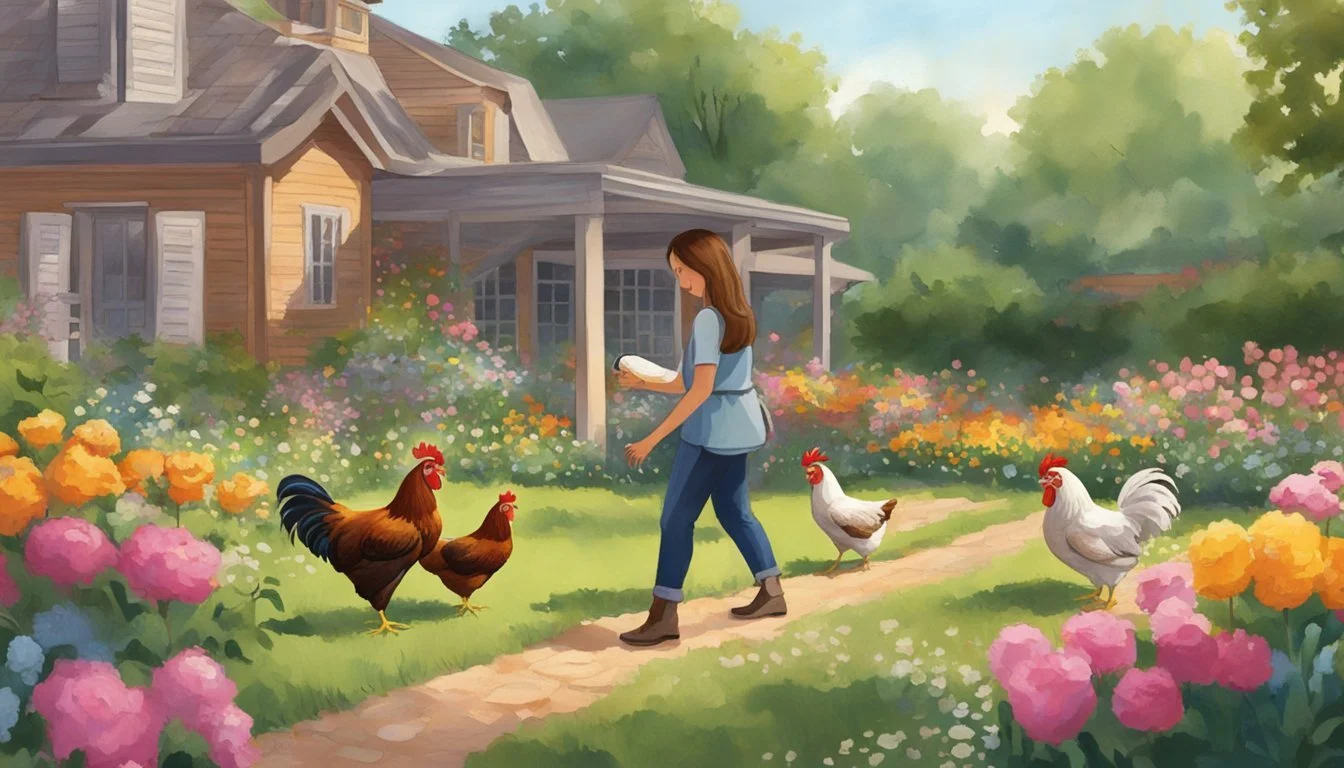Raising Backyard Chickens in Flower Mound, TX
Essential Tips for Beginners
Raising backyard chickens has become an increasingly popular practice in urban and suburban areas, and Flower Mound, Texas, is no exception. It offers residents a chance to embrace a slice of rural living by integrating small-scale poultry farming into their backyards. This trend is driven by the desire for fresh eggs, natural pest control, and the educational benefits it provides to families. The local community in Flower Mound has shown a strong interest in updating chicken ordinances to allow the practice on smaller residential lots, demonstrating a growing commitment to sustainable living.
The town of Flower Mound has taken steps to accommodate this rise in interest by easing restrictions on raising backyard chickens. With recent ordinance changes, residents can now keep up to four hens on certain residential properties, a move that aligns Flower Mound with surrounding cities that support urban agriculture. The adjustment in local laws reflects a recognition of the benefits that come with keeping chickens, such as the enhancement of food security and the promotion of organic gardening practices.
For those interested in starting their own backyard coop, understanding the regulations and best practices for raising chickens is essential. Key considerations include selecting the right chicken breeds, providing suitable and secure housing, and ensuring proper care and nutrition. Potential chicken owners are encouraged to engage with community resources and local expertise to ensure a successful and compliant backyard chicken experience.
Understanding Local Chicken Ordinances in Flower Mound
Residents of Flower Mound, TX interested in raising backyard chickens must be familiar with local ordinances specific to the town as they navigate state and county regulations.
Overview of Flower Mound Ordinances
The town of Flower Mound enforces specific ordinances that regulate the raising of backyard chickens. These ordinances are designed to maintain public health, safety, and community aesthetics. Local regulations may also evolve, as town staff periodically review and amend these ordinances to ensure their effectiveness and relevance to current standards.
State and County Regulations for Texas
Texas state laws and county regulations provide a framework within which cities and towns, including Flower Mound, can draft their local ordinances. These state and county regulations outline basic requirements for animal husbandry and health protocols that must be adhered to on top of any local laws.
Specific Restrictions and Zoning Laws in Cities
Flower Mound's local laws stipulate zoning requirements and restrictions for those who wish to keep chickens. For instance, there was a move to allow up to four hens on smaller properties. However, properties under an acre may face different restrictions, and rooster keeping might be subjected to stricter control to mitigate noise complaints.
Zoning Category Regulations Small Lots (< 1 acre) Limited Number of Chickens (typically hens only) Larger Lots (> 1 acre) More leniency, possibility to keep roosters Noise Control Restrictions on roosters in residential areas
Handling Ordinance Violations and Penalties
Non-compliance with local chicken laws can result in penalties from the town. Residents should be proactive in understanding their obligations under these laws to prevent ordinance violations. The Flower Mound Town Council handles changes to these ordinances and can levy fines for violations.
First-time Violation: Usually a warning or a small fine.
Repeated Violations: Potential for larger fines and mandatory removal of the chickens.
Residents are encouraged to engage with the Town Council and become familiar with the latest changes to ensure their backyard chicken practices are within legal bounds.
Setting Up Your Chicken Coop
When setting up a chicken coop in Flower Mound, TX, specific considerations must be made regarding location, design, protection, and climate control to ensure a thriving environment for backyard chickens.
Choosing the Right Location
The ideal location for a chicken coop is on level ground that promotes natural drainage, away from property lines to comply with local regulations, which typically require a distance from neighboring residences, schools, and churches. Coops should be positioned to receive morning sunlight yet be shaded during the peak heat of the day.
Coop Construction and Design
The construction of a chicken coop in Flower Mound must provide sufficient space for each bird. Enclosures should offer:
Inside the coop: 2-3 square feet per chicken
Outside roaming area: 8-10 square feet per chicken
Materials used must be sturdy and weather-resistant, while the design should facilitate easy cleaning and egg collection.
Safety and Protection from Predators
Protection from predators is critical. The coop must have:
Secure fittings: Doors and windows that close tightly
Reinforced enclosures: Hardware cloth instead of chicken wire
Predator deterrents: Locks and barriers to safeguard against nocturnal threats such as coyotes and raccoons
Maintaining Proper Ventilation and Temperature
Proper ventilation is essential to dissipate moisture and minimize ammonia levels. Vents should be placed high in the walls to allow for air circulation without creating drafts on the roosting birds. During the hot Texas summers, additional temperature control methods may be necessary to prevent overheating.
Selecting Your Backyard Chickens
In the pursuit of setting up a backyard flock in Flower Mound, TX, potential poultry enthusiasts must carefully choose their chickens. It's essential to consider breed characteristics, the balance of hens and roosters, the well-being of the birds, and their need for space and exercise.
Understanding Different Chicken Breeds
Different chicken breeds exhibit varying attributes; some are hardy in cold conditions, while others are better suited to warm climates. For instance, Rhode Island Reds and Plymouth Rocks are robust breeds that tolerate colder temperatures well. On the other hand, Leghorns excel in warmer environments and are prolific egg layers. When selecting chickens, one should also consider temperament, as breeds like the Silkie are known for their docile nature.
Evaluating Hen-to-Rooster Ratio
A balanced hen-to-rooster ratio is crucial to maintain harmony within a backyard flock. A common recommendation is to have approximately one rooster for every ten hens. This ratio prevents over-mating, which can stress the hens and lead to injury. In Flower Mound, be mindful of local ordinances which may regulate or prohibit roosters due to noise concerns.
Health and Wellness of Your Flock
One's backyard chickens' health is paramount. To ensure the flock thrives, provide them with a complete feed adjusted for their life stage, from "starter" crumbles for chicks to "layer" feed for egg-laying hens. Vaccinations and regular health checks are essential to prevent diseases such as Marek's disease and avian influenza.
Importance of Regular Exercise and Space
Chickens require regular exercise and ample space to forage, which promotes physical health and behavioral well-being. Design the coop and run to allow at least 10 square feet of outdoor space per chicken. Exercise can be encouraged by scattering feed and incorporating perches and environmental enrichments that simulate a natural habitat.
Daily Management and Care for Your Chickens
Proper chicken care in Flower Mound, TX requires a regimen that attends to nutrition, hydration, health, and cleanliness. Following strict practices in these areas ensures the flock thrives in the backyard environment.
Feeding and Nutrition Information
Chickens necessitate a diet balanced in proteins, vitamins, and minerals. Starter feed crumbles with 18-20% protein are ideal for chicks up to 8 weeks, transitioning to 16-18% starter/grower feed until 14 weeks. Adult chickens are typically given a 16% protein layer feed. Treats like vegetables, fruit, and grains should be given sparingly to avoid nutritional imbalance.
Chicks (0-8 weeks): 18-20% starter feed crumbles.
Young chickens (8-14 weeks): 16-18% starter/grower.
Adults (15+ weeks): 16% layer feed.
Providing Ample Water and Hydration
Chickens must have constant access to clean water. Waterers should be refilled daily with fresh water, especially during Flower Mound's hotter seasons. To minimize spillage and contamination, invest in waterers that deter chickens from roosting on them and avoid designs that can cause drowning.
Clean water: Refill daily.
Ideal waterers: Anti-roosting and drowning-prevention features.
Addressing Common Diseases and Health Issues
Vigilance aids in early detection of common diseases such as coccidiosis, respiratory infections, or parasites. Regularly check for symptoms like lethargy, coughing, or unexplained loss of feathers. Proactive measures include maintaining clean living spaces and adherence to a vaccination schedule if recommended by an avian veterinarian.
Regular health checks: Monitor for symptoms.
Cleanliness and vaccines: Preventive measures.
Managing Chicken Waste and Coop Odors
Timely management of chicken waste is crucial to control odors and maintain health. A bi-weekly cleaning schedule where waste is removed and bedding replaced keeps the coop fresh. Employ deep litter methods or frequent composting to manage waste sustainably.
Cleaning frequency: Every two weeks or as needed.
Waste management: Deep litter method, composting.
By adhering to these management practices, one ensures the overall well-being of their backyard chickens, maintaining a healthy and productive flock.
Community Interactions and Legal Considerations
When raising backyard chickens in Flower Mound, TX, residents must navigate a range of community and legal matters. From addressing noise concerns to complying with local regulations, the success of an urban poultry endeavor hinges on informed and considerate practices.
Dealing with Noise and Neighbor Concerns
Residents should be mindful that chickens can cause noise, which may lead to complaints. Flower Mound's noise ordinance requires one to keep their chicken coop in a manner that does not disturb the peace. To prevent issues:
Engage with neighbors.
Position coops away from property lines.
Consider breed selection for quieter hens.
Joining Local Facebook Groups and Communities
Joining a local Facebook group, such as Chicks 4 Flower Mound, offers invaluable support. These groups provide:
A platform for sharing tips and advice.
Opportunities to advocate for ordinance changes in a collective manner.
Understanding Homeowners Association (HOA) Rules
Homeowners association regulations may have specific restrictions on raising chickens. Homeowners should:
Review their HOA's covenants.
Seek permission where required.
Engagement with City and Local Government
It's essential for residents to stay informed on local government discussions about urban chicken keeping. Residents can:
Participate in town council meetings.
Monitor updates on proposed ordinance changes, ensuring they operate within the law.
Additional Considerations for Backyard Chicken Owners
Raising chickens in Flower Mound, TX, requires mindfulness of the unique challenges and opportunities local conditions present. From dealing with pets to tapping into community knowledge, backyard chicken owners must take proactive steps to ensure their flock's welfare.
Protecting Chickens from Domestic Animals
Backyard chickens need protection from domestic predators, particularly dogs and cats. Physical barriers are essential, as is training pets to understand that chickens are not prey. Fencing must be sturdy and extend underground to deter digging. Regular inspections for potential weak spots can prevent tragic losses.
Learning from Local Experts
Local chicken experts, such as Regina Fierke and Mark Glover, are invaluable resources for new owners. They offer insights tailored to conditions in Flower Mound—such as selecting breeds that thrive on smaller acre plots typical to residential areas. Their advice can significantly enhance survival rates and egg production.
Participating in Chicken Keeping Workshops
Workshops on weekends, particularly on Saturday, provide hands-on experience and up-to-date practices in chicken keeping. These workshops often cover a range of topics, from coop construction to optimal feed types. Attendance at these events can equip owners with the knowledge required to maintain a thriving backyard flock.
Staying Updated on Local Poultry Events
Flower Mound offers numerous events for poultry enthusiasts to learn and share experiences. Owners should monitor these occasions, as they often include updates on local regulations that impact residential chicken keepers in TX. Events also serve as networking opportunities, fostering community support among local chicken owners.
Conclusion
Flower Mound, Texas, has a heritage that reflects a connection with the land, mirroring its agrarian past where families commonly raised chickens. Over time, regulations changed, but the community's interest in maintaining and caring for backyard chickens persisted. The town’s approach to managing this interest has evolved. The Town Council's decision to ease chicken ordinances signifies a recognition of resident desires, allowing up to four hens on smaller properties. This initiative aligns Flower Mound with other Texas cities that endorse urban agriculture.
Residents must stay informed of the specifics of these regulations, remembering that roosters may not be permitted due to noise concerns. The benefits of raising hens include fresh eggs, natural pest control, and educational opportunities. However, responsibility comes hand-in-hand with chicken ownership, as proper care and maintenance are essential for animal welfare and neighborly relations.
Those interested should consider:
The Town of Flower Mound's specific ordinances governing backyard chickens
Best practices in chicken care and coop maintenance
Engagement with the local community for support and advice
The trend towards self-sufficiency and sustainable living has found a place in Flower Mound. It is these small steps at the local level that deliver a deeper connection to food sources and the environment, enriching the everyday lives of residents.








